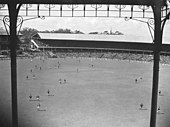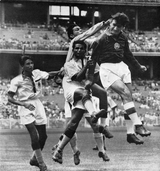Association football at the 1956 Summer Olympics
| Tournament details | |
|---|---|
| Host country | Australia |
| Dates | 24 November – 8 December 1956 |
| Teams | 11 |
| Venue(s) | 2 (in 1 host city) |
| Final positions | |
| Champions | |
| Runners-up | |
| Third place | |
| Fourth place | |
| Tournament statistics | |
| Matches played | 12 |
| Goals scored | 53 (4.42 per match) |
| Attendance | 194,333 (16,194 per match) |
| Top scorer(s) | (4 goals each)[1] |
← 1952 1960 → | |
The association football tournament at the 1956 Summer Olympics was won by the Soviet Union.[2][3]
Defending champions Hungary were forced to withdraw due to the Soviet invasion of their country. This was the first Olympic football tournament where all the medalists were communist countries, with Yugoslavia and Bulgaria took silver and bronze respectively.
Background
[edit]Following five withdrawals, the tournament featured three Eastern Bloc teams and four from Asia. The other sides included in the draw were the United States, the United Team of Germany (which was de facto West Germany), Great Britain and the hosts Australia, competing in their first Olympic football tournament.
The tendency of Eastern bloc countries to provide state-funding for their athletes put Western amateurs at a significant disadvantage. As a result, all Olympic football tournaments 1952 onwards were dominated by the Soviet Union and its satellites.[4][5]
Venues
[edit]| Melbourne | ||||
|---|---|---|---|---|
| Olympic Park Stadium | Melbourne Cricket Ground | |||
| Capacity: 40,000 | Capacity: 104,000 | |||

|

| |||
Teams
[edit]Qualification
[edit]|
|
Squads
[edit]First round
[edit]
Five of the sixteen qualified teams withdrew before the final draw: ![]() China (boycotted the Games to protest the reception of Taiwan),
China (boycotted the Games to protest the reception of Taiwan), ![]() Egypt (withdrew due to Suez Crisis),
Egypt (withdrew due to Suez Crisis), ![]() Turkey,
Turkey, ![]() South Vietnam, and the defending Olympic champions and recent World Cup runners-up
South Vietnam, and the defending Olympic champions and recent World Cup runners-up ![]() Hungary, a nation that was cheered in other Olympic contests due to their ongoing suppression by Soviet troops.
Hungary, a nation that was cheered in other Olympic contests due to their ongoing suppression by Soviet troops.
Therefore, only three games were played in the first round: as China and Turkey had been drawn against each other, their match was scratched.
The Soviet Union defeated the United Team of Germany 2–1, Great Britain defeated Thailand 9–0, and Australia defeated Japan 2–0.
| Soviet Union | 2–1 | |
|---|---|---|
| Isayev Streltsov |
Report | Habig |
| Great Britain | 9–0 | |
|---|---|---|
| Twissell Lewis Laybourne Bromilow Topp |
Report |
Byes: Bulgaria ![]() (drawn against Egypt, who withdrew), India
(drawn against Egypt, who withdrew), India ![]() (drawn against Hungary, who withdrew), Indonesia
(drawn against Hungary, who withdrew), Indonesia ![]() (drawn against South Vietnam, who withdrew), United States
(drawn against South Vietnam, who withdrew), United States ![]() and
and ![]() Yugoslavia (drawn against each other: match was postponed to the quarter-finals).
Yugoslavia (drawn against each other: match was postponed to the quarter-finals).
Quarter-finals
[edit]Yugoslavia defeated the United States 9–1.
Bulgaria led Great Britain 3–1 at half-time, when ratings from HMS Newcastle vaulted the fence and exhorted the team to show more grit, after which they were peacefully escorted off the field. The British team went on to lose 6–1.[6]
The Soviet Union drew their game against Indonesia 0–0 and won 4–0 in the replay.
The Indians defeated Australia 4–2 with a hat trick by centre forward Neville D'Souza, the first by an Asian in the Olympics. Prior to the game there had been debate, once again, as to whether the Indians should be shod. Sir Stanley Rous respected their decision either way, although in the end, the Indians decided to wear boots.
| Yugoslavia | 9–1 | |
|---|---|---|
| Veselinović Antić Mujić Papec |
Report | Zerhusen |
| Soviet Union | 0–0 (a.e.t.) | |
|---|---|---|
| Report |
Semi-finals
[edit]Yugoslavia defeated India 4–1. It would be their third consecutive Olympic final, after losing both in 1948 and 1952.
The Soviets defeated Bulgaria 2–1. Normal time finished 0–0, and Bulgaria scored first in extra time before conceding two goals in the last six minutes of the game.
| Yugoslavia | 4–1 | |
|---|---|---|
| Papec Veselinović Salam |
Report | D'Souza |
Bronze medal match
[edit]Bulgaria took Bronze defeating India 3–0.
Gold medal match
[edit]Yugoslavia were playing Red Star Belgrade's Dragoslav Šekularac in this tournament; he would feature in the 1960 European Nations' Cup final again versus the USSR. They lost 1–0 to a second half Anatoli Ilyin goal, with the Soviet Union winning the title.
| Soviet Union | 1–0 | |
|---|---|---|
| Ilyin |
Report |
| Team details | ||||||||||||||||||||||||||||||||||||||||||||||||||||||||||||||||||||||||||||||||||||||||
|---|---|---|---|---|---|---|---|---|---|---|---|---|---|---|---|---|---|---|---|---|---|---|---|---|---|---|---|---|---|---|---|---|---|---|---|---|---|---|---|---|---|---|---|---|---|---|---|---|---|---|---|---|---|---|---|---|---|---|---|---|---|---|---|---|---|---|---|---|---|---|---|---|---|---|---|---|---|---|---|---|---|---|---|---|---|---|---|---|
| ||||||||||||||||||||||||||||||||||||||||||||||||||||||||||||||||||||||||||||||||||||||||
Bracket
[edit]
| First round | Quarter-finals | Semi-finals | Final | |||||||||||
| |
||||||||||||||
| November – Olympic Park | ||||||||||||||
| bye | ||||||||||||||
| |
9 | |||||||||||||
| |
1 | |||||||||||||
| |
||||||||||||||
| December – MCG | ||||||||||||||
| bye | ||||||||||||||
| |
4 | |||||||||||||
| November | ||||||||||||||
| |
1 | |||||||||||||
| |
2 | |||||||||||||
| December – MCG | ||||||||||||||
| |
0 | |||||||||||||
| |
2 | |||||||||||||
| |
4 | |||||||||||||
| |
||||||||||||||
| December – MCG | ||||||||||||||
| bye | ||||||||||||||
| |
0 | |||||||||||||
| |
1 | |||||||||||||
| |
||||||||||||||
| December – Olympic Park | ||||||||||||||
| bye | ||||||||||||||
| |
0 | |||||||||||||
| November | ||||||||||||||
| |
4 | |||||||||||||
| |
2 | |||||||||||||
| December – Olympic Park | ||||||||||||||
| |
1 | |||||||||||||
| |
2 | |||||||||||||
| |
1 | |||||||||||||
| |
||||||||||||||
| December – MCG | ||||||||||||||
| bye | ||||||||||||||
| |
6 | |||||||||||||
| November | December – MCG | |||||||||||||
| |
1 | |||||||||||||
| |
9 | |
0 | |||||||||||
| |
0 | |
3 | |||||||||||
Goalscorers
[edit]There were 53 goals scored in 12 matches, for an average of 4.42 goals per match.
4 goals
3 goals
2 goals
1 goal
1 own goal
Medalists
[edit]References
[edit]- ^ Olympic Football Tournament Melbourne 1956 – Top goalscoring players. FIFA.com
- ^ "Football at the 1956 Melbourne Summer Games". Sports Reference. Archived from the original on 17 April 2020. Retrieved 13 October 2018.
- ^ Esamie, Thomas (sources: Sydney Morning Herald; personal records of Alan Garside Snr) (25 October 1999). "Games of the XVI. Olympiad: Football Tournament (Melbourne, Australia, 24th November – 8th December 1956)". RSSSF. Archived from the original on 22 September 2008. Retrieved 14 October 2022.
{{cite web}}: CS1 maint: multiple names: authors list (link) - ^ "Australian Online Soccer Museum". Archived from the original on 3 November 2005. Retrieved 3 November 2006.
- ^ Fútbol en los Juegos OlímpicosArchived 5 September 2021 at the Wayback Machine by José M. Martín, 8 August 2021
- ^ "News .....taken from "The Socceroos and their Opponents" by Laurie Schwab". Australian Online Soccer Museum. Australian Soccer Preservation Society. Archived from the original on 27 August 2006.


